Plot summary
The novel opens with a distressed letter from Lady Howard to her longtime acquaintance, the Reverend Arthur Villars, in which she reports that Madame (Mme) Duval, the grandmother of Villars' ward, Evelina Anville, intends to visit England to renew her acquaintance with her granddaughter Evelina. Eighteen years earlier, Mme Duval had broken off her relationship with her daughter Caroline, Evelina's mother, but never knew of the birth or even existence of Evelina until Evelina was in her late teens. Upon this discovery, Mme Duval desires to reclaim Evelina and whisk her away to France as her closest blood relation. Reverend Villars fears Mme Duval's influence could lead Evelina to a fate similar to that of her mother Caroline, who secretly wedded Sir John Belmont, a libertine, who afterwards denied the marriage. To keep Evelina from Mme Duval, the Reverend lets her visit Howard Grove, Lady Howard's home, on an extended holiday. While she is there, the family learns that Lady Howard's son-in-law, naval officer Captain Mirvan, is returning to England after a seven-year absence. Desperate to join the Mirvans on their trip to London, Evelina entreats her guardian to let her attend with them, promising that the visit will last only a few weeks. Villars reluctantly consents.
In London, Evelina's beauty and ambiguous social status attract unwanted attention and unkind speculation. Ignorant of the conventions and behaviours of 18th-century London society, she makes a series of humiliating (but humorous) faux pas that further expose her to social ridicule. She soon earns the attentions of two gentlemen: Lord Orville, a handsome and extremely eligible peer and pattern-card of modest, becoming behaviour; and Sir Clement Willoughby, a baronet with duplicitous intentions. Evelina's untimely reunion in London with her grandmother and the Branghtons, her long-unknown extended family, along with the embarrassment their boorish, social-climbing antics cause, soon convince Evelina that Lord Orville is completely out of reach.
The Mirvans finally return to the country, taking Evelina and Mme Duval with them. Spurred by Evelina's greedy cousins, Mme Duval concocts a plan to sue Sir John Belmont, Evelina's father, and force him to recognize his daughter's claim to his estate in court. Reverend Villars is displeased, and they decide against a lawsuit, but Lady Howard still writes to Sir John Belmont, who responds unfavourably. He does not believe it possible for Evelina to be his daughter, as he already has a young lady who is his supposed daughter (who, unbeknownst to him is actually illegitimate), and therefore assumes Mme Duval to be trying to dupe him for his money.
Mme Duval is furious and threatens to rush Evelina back to Paris to pursue the lawsuit. A second compromise sees Evelina return to London with her grandmother, where she is forced to spend time with her ill-bred Branghton cousins and their rowdy friends, but she is distracted by Mr. Macartney, a melancholy and direly-poor Scottish poet. Finding him with a pair of pistols, she supposed him to be considering suicide and bids him to look to his salvation; later he informs her that he has been contemplating not only self-destruction but more-so highway robbery. He is in dreadful financial straits, is engaged in tracing his own obscure parentage, as well as recovering from his mother's sudden death and the discovery that his beloved is actually his sister. Evelina charitably gives him her purse. Otherwise, her time with the Branghtons is uniformly mortifying: during her visit to the Marylebone pleasure garden, for instance, she is attacked by a drunken sailor and accosted by several rowdy men before being rescued by prostitutes—and in this humiliating company, she meets Lord Orville again. Sure that he can never respect her now, she is stunned when he seeks her out in London's unfashionable section and seems interested in renewing their acquaintance. When an insulting and brash letter supposedly from Lord Orville devastates her and makes her believe she misperceived him, she returns home to Berry Hill and falls ill.
Slowly recuperating from her illness, Evelina agrees to accompany her neighbour, a sarcastically tempered widow named Mrs. Selwyn, to the resort town of Clifton Heights, where she unwillingly attracts the attention of womanizer Lord Merton, on the eve of his marriage to Lord Orville's sister, Lady Louisa Larpent. Aware of Lord Orville's arrival, Evelina tries to distance herself from him because of his impertinent letter, but his gentle manners work their spell until she is torn between attraction to him and belief in his past duplicity.
The unexpected appearance of Mr. Macartney reveals an unexpected streak of jealousy in the seemingly imperturbable Lord Orville. Convinced that Macartney is a rival for Evelina's affections, Lord Orville withdraws. However, Macartney has intended only to repay his financial debt to Evelina.
Lord Orville's genuine affection for Evelina and her assurances that she and Macartney are not involved finally win out over Orville's jealousy, and he secures a meeting between Evelina and Macartney. It appears that all doubts have been resolved between Lord Orville and Evelina, especially when Mrs. Selwyn informs her that she overheard Lord Orville arguing with Sir Clement Willoughby about the latter's inappropriate attentions to Evelina. Lord Orville proposes, much to Evelina's delight. However, Evelina is distraught at the continuing gulf between herself and her father and the mystery surrounding his false daughter. Finally, Mrs. Selwyn is able to secure a surprise meeting with Sir John. When he sees Evelina, he is horrified and guilt-stricken because she clearly resembles her mother, Caroline. This means that the other Miss Belmont (the false daughter) is recognized as a fraud. Evelina is able to ease his guilt with her repeated gentle pardons and the delivery of a letter written by her mother on her deathbed in which she forgives Sir John for his behaviour if he will remove her ignominy (by acknowledging their marriage) and acknowledge Evelina as his legitimate daughter.
Mrs Clifton, Berry Hill's longtime housekeeper, is able to reveal the second Miss Belmont's parentage. She identifies Polly Green, Evelina's former wet nurse, mother of a girl 6 weeks older than Evelina, as the perpetrator of the fraud. Polly has been passing her own daughter off as that of Sir John and Caroline for the past 18 years, hoping to secure a better future for her. Ultimately, Lord Orville suggests that the unfortunate girl be named co-heiress with Evelina; kindhearted Evelina is delighted.
Finally, Sir Clement Willoughby writes to Evelina, confessing that he had written the insulting letter (she had already suspected this), hoping to separate Evelina and Lord Orville. In Paris, Mr. Macartney is reunited with the false Miss Belmont, his former beloved: separated by Sir John, at first because Macartney was too poor and lowly to marry his purported daughter, and then because his affair with Macartney's mother would have made the sweethearts brother and sister, they are now able to marry because Miss "Belmont"'s true parentage has been revealed and the two are not related at all. They are married in a joint ceremony alongside Evelina and Lord Orville, who decide to visit Reverend Villars at Berry Hill for their honeymoon trip. [2]

Frances Burney, also known as Fanny Burney and later Madame d'Arblay, was an English satirical novelist, diarist and playwright. In 1786–1790 she held the post of "Keeper of the Robes" to Charlotte of Mecklenburg-Strelitz, George III's queen. In 1793, aged 41, she married a French exile, General Alexandre d'Arblay. After a long writing career and wartime travels that stranded her in France for over a decade, she settled in Bath, England, where she died on 6 January 1840. The first of her four novels, Evelina (1778), was the most successful and remains her most highly regarded, followed by Cecilia (1782). Most of her stage plays were not performed in her lifetime. She wrote a memoir of her father (1832) and many letters and journals that have been gradually published since 1889, forty-nine years after her death.
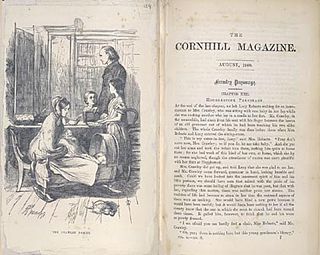
Framley Parsonage is a novel by English author Anthony Trollope. It was first published in serial form in the Cornhill Magazine in 1860, then in book form in April 1861. It is the fourth book in the Chronicles of Barsetshire series, preceded by Doctor Thorne and followed by The Small House at Allington.
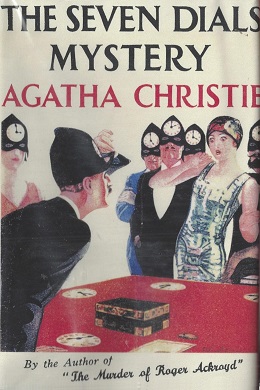
The Seven Dials Mystery is a work of detective fiction by Agatha Christie, first published in the UK by William Collins & Sons on 24 January 1929 and in the US by Dodd, Mead and Company later in the same year.

Richard Savage was an English poet. He is best known as the subject of Samuel Johnson's Life of Savage, originally published anonymously in 1744, which is based on one of the most elaborate of Johnson's Lives of the English Poets.

Lady Charlotte Susan Maria Bury was an English novelist, who is chiefly remembered in connection with a Diary illustrative of the Times of George IV (1838).
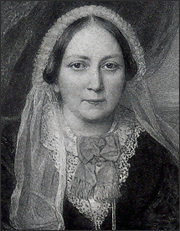
Ellen Price was an English novelist better known as Mrs. Henry Wood. She is best remembered for her 1861 novel East Lynne. Many of her books sold well internationally and were widely read in the United States. In her time, she surpassed Charles Dickens in fame in Australia.
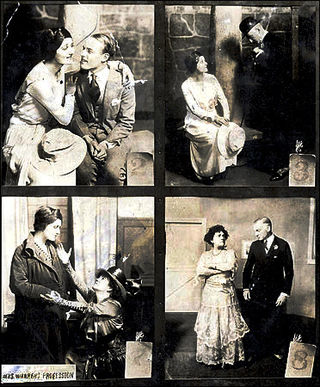
Mrs. Warren's Profession is a play written by George Bernard Shaw in 1893, and first performed in London in 1902. It is one of the three plays Shaw published as Plays Unpleasant in 1898, alongside The Philanderer and Widowers' Houses. The play is about a former prostitute, now a madam, who attempts to come to terms with her disapproving daughter. It is a problem play, offering social commentary to illustrate the idea that the act of prostitution was not caused by moral failure but by economic necessity. Elements of the play were borrowed from Shaw's 1882 novel Cashel Byron's Profession, about a man who becomes a boxer due to limited employment opportunities.
Nathaniel Clements, 2nd Earl of Leitrim, KP PC (Ire), styled The Honourable from 1783 to 1795, and then Viscount Clements to 1804, was an Irish nobleman and politician.

William Charles Keppel, 4th Earl of Albemarle, GCH, PC, briefly styled Viscount Bury between May and October 1772, was a British Whig politician.
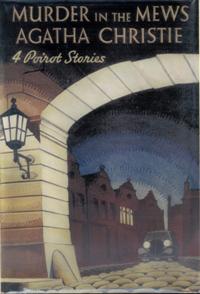
Murder in the Mews and Other Stories is a short story collection by British writer Agatha Christie, first published in the UK by Collins Crime Club on 15 March 1937. In the US, the book was published by Dodd, Mead and Company under the title Dead Man's Mirror in June 1937 with one story missing ; the 1987 Berkeley Books edition of the same title has all four stories. All of the tales feature Hercule Poirot. The UK edition retailed at seven shillings and sixpence (7/6) and the first US edition at $2.00.
The Palliser novels are six novels written in series by Anthony Trollope. They were more commonly known as the Parliamentary novels prior to their 1974 television dramatisation by the BBC broadcast as The Pallisers. Marketed as "polite literature" during their initial publication, the novels encompass several literary genres including: family saga, bildungsroman, picaresque, as well as satire and parody of Victorian life, and criticism of the British government's predilection for attracting corrupt and corruptible people to power.

He Knew He Was Right is an 1869 novel written by Anthony Trollope which describes the failure of a marriage caused by the unreasonable jealousy of a husband exacerbated by the stubbornness of a willful wife. As is common with Trollope's works, there are also several substantial subplots. Trollope makes constant allusions to Shakespeare's Othello throughout the novel. Trollope considered this work to be a failure; he viewed the main character as unsympathetic, and the secondary characters and plots as much more lively and interesting, but it is one of his best known novels. It was adapted for BBC One in 2004 by Andrew Davies.
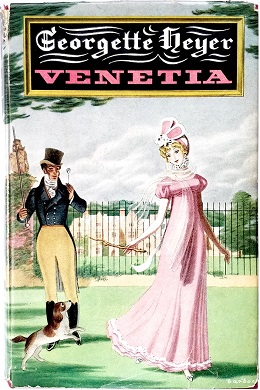
Venetia is a Regency romance novel by Georgette Heyer set in England in 1818.
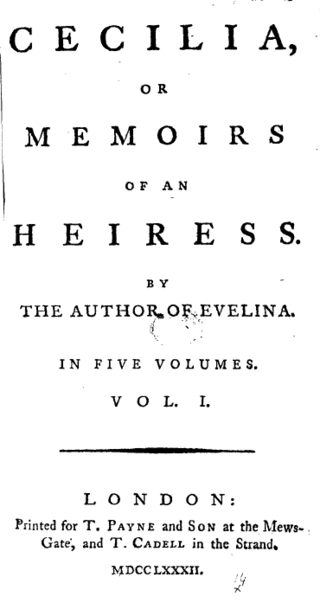
Cecilia, subtitled Memoirs of an Heiress, is the second novel by English author Frances Burney, set in 1779 and published in 1782. The novel, about the trials and tribulations of a young upper-class woman who must negotiate London society for the first time and who falls in love with a social superior, belongs to the genre of the novel of manners. A panoramic novel of eighteenth-century London, Cecilia was highly successful with at least 51 editions.
Camilla, subtitled A Picture of Youth, is a novel by Frances Burney, first published in 1796. Camilla deals with the matrimonial concerns of a group of young people: Camilla Tyrold and her sisters, the sweet tempered Lavinia and the smallpox scarred Eugenia, and their cousin, the beautiful Indiana Lynmere—and in particular, with the love affair between Camilla herself and her eligible suitor, Edgar Mandlebert. They have many hardships, however, caused by misunderstandings and mistakes, in the path of true love.

Lady Louisa Stuart was a British writer of the 18th and 19th centuries. Her long life spanned nearly ninety-four years.
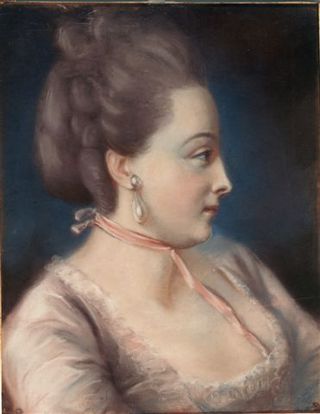
Michelle Sentuary, married name Jean-Cyrille Guesnon de Bonneuil, was a French overseas agent during the French Revolution and First French Empire. Inspiring André Chénier and others, she was a lady "celebrated for her beauty and her agreeable spirit" according to the formula of Charles de Lacretelle himself a friend of Chénier. She stands for thousands of women in modern and contemporary historiography, and has had several biographies in biographical dictionaries. She was the mother of Amédée Despans-Cubières.
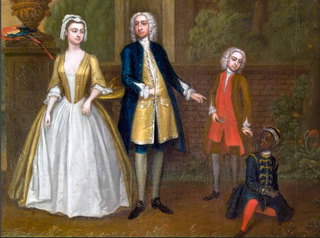
Edward Southwell, 20th Baron de Clifford was a British politician.
Caroline Burney was the pseudonym of the author of two early 19th-century three-volume novels published in London: Seraphina (1809) and Lindamira (1810). The real identity of the author has not been discovered.
Marchmont is Charlotte Smith's ninth novel, and follows the story of her heroine, Althea Dacres, and the Marchmont family. It was published in August 1796.















